- Home
- James Rollins
Bloodline: A Sigma Force Novel Page 16
Bloodline: A Sigma Force Novel Read online
Page 16
Seeing the confused look on the captive’s face, Baashi repeated what he said in Somali. Then he stepped over like an excited tour guide and patted Kane, too, ending with “He good dog.”
Gray sidled next to Alden during all of this. “See if Baashi could ask the boy if he knows where Amanda was taken.”
“I’ll do my best.”
Gray had to wait while a fervid series of exchanges commenced. It involved a lot of back-and-forth and not a few suspicious glances cast his way. Finally, the boy seemed to relent. Pointing this way and that, he spoke briskly in Somali.
Alden eventually straightened and rejoined Gray.
“It seems, like with Baashi, people are willing to speak more openly around a child. He overheard some of the medical staff at the camp talking, making preparations to move the young woman to an airfield used by drug-runners. He says he heard them speak of flying to Dubai. But I don’t know if that’s just a stopover or a final destination because he also said they’re planning to go to heaven.”
To go to heaven? What did that mean? Was it some sort of suicide pact?
That didn’t sound like the enemy—and certainly not the Guild. Alden must have read his confusion and shrugged. He had no better explanation.
Still, Gray’s mood lightened. “At least, Dubai gives us a solid place to start looking. To hopefully pick up her trail again.”
Alden stared over at Jain, on a stretcher, one pant leg cut away. “Good luck, commander. I’ll see to the boys here.” He motioned to Baashi and the other kid. “In the meantime—”
The thumping of a helicopter cut him off, drawing his attention skyward.
“I believe that’s your SEAL team,” the captain said. “A bit late to the bloody party, but they can help secure the area. I’d suggest you and your team borrow that helo of mine. Clear out before too many questions get asked.”
“Before that,” Gray started, “about Amanda …”
Alden winked at him. “I heard she died here. A real tragedy.” So the good captain had already perceived, as Painter had, that Amanda’s best chance of survival lay in everyone continuing to believe that lie. “That’s what I’ll be reporting to my superiors.”
“Thank you,” Gray said and shook the man’s hand, grasping his forearm with the other.
“No thanks needed, mate. If it wasn’t for your quick thinking, there would’ve been more casualties at that UNICEF camp, including possibly my own men.”
With matters settled, Gray drew his group together and hurried toward the idling chopper. He wanted to be out of here before the SEALs clamped things down. The SEAL team was under orders to retrieve the charred body, to return the supposed remains of the president’s daughter back to the States—not a duty he would wish on anyone.
He called Painter again, reported what he’d learned, and coordinated logistics on their next move.
“We’re pulling up stakes here,” Gray said. “Any intelligence Kat can gather while we’re en route would help us hit the ground running once we’re wheels-down in Dubai City.”
“Understood. I’ll put a team on it. But I’ve got Kat working another angle.”
Gray paused as everyone loaded into the helicopter. Tucker lifted his dog. “What other angle?”
As Painter explained his worry that all of this bloodshed and terror somehow involved Amanda’s unborn child, Gray pictured the brutality of the cesarean performed on the anonymous woman, her body charred beyond recognition.
In his gut, Gray knew the director was correct.
This was all about the baby.
As he signed off and strapped into his seat aboard the chopper, another concern nagged him. It also centered on Amanda and her child. Gray couldn’t escape the sense that Painter had been withholding something from him. The director’s decision to keep Amanda’s survival a secret from her own parents never sat right with him. Painter was certainly a master chess player and could be coldhearted and tough when he had his back against the wall—but never this callous. His explanation felt forced, like there was something he didn’t want to share about Amanda or her family.
But what could it be?
With a roar of its engines, the helicopter slowly rose from the ruins of the camp, stirring smoke and ash, leaving the horrors below.
He might not know what gambit Painter was playing—but he knew one thing for certain.
This was just the beginning.
Much worse was still to come.
11:00 A.M. EST
Washington, DC
Robert Gant stepped through the air lock and entered the Class 1000 clean room, a stark white chamber with glass walls that looked out into the rest of the genomics lab. Staffed only by three researchers, the entire facility lay in an industrial area on the outskirts of Alexandria, virginia, and was listed as a private DNA test lab.
But that was not its purpose.
Its true function had been etched into one of the glass walls of the clean room: a frosted cross, decorated with spirals of DNA along its crosspieces.
“Show me,” he said, using the deep baritone that served him well in the past as a U.S. ambassador and now as secretary of state.
He allowed some of his irritation to ring out. He’d left Jimmy and Teresa to their grief to attend to private family business, but he wanted to keep this visit as short as possible.
The researcher, Dr. Emmet Fielding—decked out in white coveralls, gloves, boots, and hood—drew him to a laboratory table. A sealed crystal cylinder, about the size and shape of a hockey puck, held a murky aquamarine fluid. Beside it on the table rested a titanium sculpture that looked like a clawless crab supported by six articulated legs. Its flat metal carapace measured a foot across, reminding Robert of the land mines that still peppered Southeast Asia, where he’d spent the bulk of his ambassadorship.
Fielding lifted the cylinder from the table and held it in the palm of his hand. “This is the latest generation,” he said proudly. “Half a million neurons harvested from human fetal cortical tissue to form this new brain. And, once implanted, it will communicate via five thousand micro-electrodes. A fourfold improvement from the last generation.”
And a huge advance from where this all started.
This was Robert’s pet project. He had learned of the first tentative steps taken by the University of Reading in England back in 2009. A researcher in neuro-robotics discovered that a handful of neurons, collected from the cortex of lab rats and grown in a culture medium, could be wired into a small wheeled robot, and through electrode stimulation, it could control and operate the tiny vehicle, learning over time as new synapses formed to avoid objects and work through mazes. Shortly thereafter, another scientist, at the University of Florida, upped the ante, wiring twenty-five thousand rat neurons to a flight simulator. Over time that tiny brain learned to fly a jet flawlessly through mountains and thunderstorms.
Years later, utilizing the family’s financial and technological resources, Robert had moved that bar much higher. Initially, the research had been folded into a larger project, one going back decades, investigating the fusion of man and machine as a means of extending life—a goal sought by the Bloodline for centuries.
But this research into cyborg technology proved to be a dead end. It became clear that it would never be a feasible means of sustaining or prolonging life, especially with the more promising advent of stem-cell research. At that point in time, the Bloodline turned its eye in a new direction, forsaking the macro world of robotics for the micro world of genetics.
But even Robert didn’t have full access to that newest venture.
Instead, he’d been left to oversee this older project. Neuro-robotics still showed the potential to be a lucrative new weapons technology for the military. If rat brains could fly jet planes years ago, why not something more ambitious for the battlefield of the future?
“Let me give you a demonstration of the hexapod,” Fielding said.
The researcher opened the titanium carapace of the me
tal crab, exposing the microelectronics inside. He seated the neural cylinder into the electrode base at the heart of the pod and secured everything in place. Next, he carried the device to a neighboring chamber in the clean room. It had been set up as a test maze—but this was no ordinary flat puzzle. This labyrinth filled the entire ten-by-ten chamber, rising through fifteen levels of tunnels, chutes, and spirals.
“I ran the hexapod through this maze once already today. Now watch.”
Fielding inserted the crab-like machine through a lower slot, sealed the door, and used a Bluetooth device to activate it.
Tiny green lights flared along a groove that ran around the periphery of the hexapod’s carapace. Titanium legs stretched and tapped.
Robert leaned closer, unimpressed. “Why isn’t it—?”
The creature shot away, dancing on its six legs, gaining speed until it was a silvery blur. It sped through the maze with unerring accuracy, no doubling back to correct a wrong turn. It had remembered the complex path through the maze perfectly.
“I’m estimating the new brain’s neural intelligence is about that of your average canine,” Fielding said proudly.
A half-minute later, the hexapod reached the exit platform near the top, skidding to a stop.
Robert grinned. “Impressive.”
Fielding matched that expression, thrilled at the rare praise. He reached to the door and unlatched it. Before he could swing it open, the hexapod rammed forward. It burst out and latched its legs onto the researcher’s forearm. The sharp-pointed legs dug into his flesh. Blood seeped through his white coveralls.
“Motherf—” Fielding yelled and hit the Bluetooth controller, powering down the hexapod.
Still, he had to return to the table and manually pry each leg out of his arm to get it to release.
“The aggression of this newest generation is also through the roof,” Fielding said, wincing and nursing his bloody arm as proof. “I’d say we’ve engineered the equivalent of a limbic region of the mammalian brain, the lizard intelligence buried beneath the cortex, driven by base needs for survival.”
“For a battlefield weapon, that’s not an undesirable trait.”
“True.”
“And speaking of battlefields, you promised a field trial of the latest hexapods. That’s why I came all the way down here in person.”
“Of course. I have a monitor set up over here with live feed from the Lodge. Everything’s ready. They’ve been waiting for the green light.”
Robert followed Fielding to a fifty-two-inch HD monitor. The screen was subdivided into sections, each offering a different bird’s-eye view of a remote and isolated patch of woodland hills hundreds of miles away.
The centermost square showed a small concrete bunker sticking out of a meadow, like a giant anthill. A metal door sealed it shut.
“If you’re ready?” Fielding said.
“Get on with it,” Robert snapped.
Fielding spoke into a cell phone. Moments later, the metal door burst open and a woman was shoved outside. She wore a hospital gown and nothing else. She stumbled to her knees, shielding her eyes against the midday sun. Robert absently wondered how long it had been since the young woman had seen actual sunlight.
From the way she jumped and glanced back to the door, someone must have barked at her.
“They’re telling her to run if she wants to live.”
Robert frowned, not appreciating the sadism. This was an experiment, not a bloody sport, and should be conducted as such.
The subject took off for the forest at a dead run.
“There!” Fielding pointed to movement through the grasses, a dozen arrows, aiming for the fleeing woman. A pair split off, zipping away faster, intending to flank her. “Look how they’re pattern-swarming. I employed a new wireless communications system and linked the individual hexapods to one another, allowing them to function as a group or pack. Look how quickly they’re learning.”
Robert watched—half-aghast, half-excited.
The woman made it to the edge of the woods, but she must have heard the hunters. She looked over a shoulder, and the horror of what she saw tripped her feet. She fell to her knees, her mouth open in a silent scream.
Then the hunters reached her.
It did not take long.
Fielding held his chin in one hand, appraising the trial. “The new battlefield modifications of the pods seem to be working as engineered. The circular blades, the razored leg flanges … all performed flawlessly. I may want to tinker with the digging spades, see if I can get them to burrow better.”
“I’ve seen enough,” Robert said, straightening and stepping away.
Fielding followed him. “With your approval, I’d like to move the testing forward into the larger quadruped line.”
“That would be fine.”
Fielding pressed him. “But I’d need a few more test subjects. Something more challenging.”
Robert pictured the macerated remains of the woman on the screen. “I’m sure we can find them somewhere.”
SECOND
HEAVEN AND HELL
18
July 2, 11:56 A.M. EST
Charleston, South Carolina
Captain Kathryn Bryant had come to sell her body.
She stepped off the crosstown bus into the steamy swelter of a Charleston summer. Her worn sneakers crunched in the gravel at the shoulder of the road. She pulled on a pair of cheap sunglasses purchased at the airport against the glare of the sun, but they did nothing for the heat.
Ninety degrees with ninety percent humidity.
I thought Washington’s summers were bad.
In a feeble attempt to compensate, she’d gathered her long auburn hair into a ponytail and wore a ball cap to shade her face. She also wore a pair of light shorts and a nondescript loose blouse, no bra, finishing her appearance as a down-on-her-luck woman looking for a little extra money.
The bus pulled away with a choking cough of diesel fumes. She followed in its wake.
The North Charleston Fertility Clinic rose two blocks ahead, the complex covered a full city block, set amid a small park of towering oaks and palmettos. The rest of the neighborhood was a mix of commercial businesses and trailer parks. She was not unfamiliar with the area, having spent a few months while in service at the naval Weapons station, which hugged the Cooper River three miles away.
As she headed toward the clinic, she slipped out her cell phone to keep a promise. The phone was a disposable, tied to her alias. She connected her call through Sigma to ensure it couldn’t be traced. If anyone tried to pull the LUDs, the phone records would only discover a call placed to a local pawnshop.
The line clicked and a gruff voice answered, “So you’re still alive?”
Her husband, Monk, did his best to make it sound like a joke, but she heard the undercurrent of tension in his voice. He hadn’t been thrilled she’d taken this assignment, but he understood the necessity.
“For the moment,” she replied with a smile. “I’m just heading toward the clinic.”
“You give them hell.”
Her smile widened. “That’s the plan.”
She pictured Monk at their apartment, balancing one of their babies on his knee. He was not what most women would consider handsome, with his shaved head and stocky but muscular physique, but he still could make her melt with his smile and she’d never met a man with a bigger heart, a heart that only grew larger with each addition to the household.
“Did you give Harriet her second bottle?” she asked.
An exasperated sigh followed. “Yes, dear. And I went to Costco and got the Pampers. You go save the world. I’ve got things covered here.”
She had hoped her call would erase that edge of apprehension hiding behind his jovial banter, but it only seemed to make it worse.
“Monk, I’m almost at the clinic. Give Penny and Harriet a kiss for me.”
“Done. And I’ll save what I’ve got for you until you get home.”
&
nbsp; “Ah, always my gallant knight,” she said sarcastically—but it was forced. Because he was her knight … and always would be.
His voice grew husky. “Just get back here safely.”
“I promise.”
“You’d better. I’m holding you to it.”
After she hung up, the world seemed slightly less bright. A twinge of guilt plagued her as she pocketed her phone.
What am I doing here? I should be at home.
Still, she could not discount the electric thrill that coursed through her as she reached the grounds of the clinic and turned her attention to the task at hand. It happened with every mission. She had a duty, and she was good at what she did. And knowing her family was safe—and always would be with Monk—helped steady her. He was her rock, even hundreds of miles away.
With renewed determination, she crossed along the tall stacked-stone fence of the clinic and stepped through the wrought-iron gates, entering a garden oasis set amidst the surrounding commercial parks. A path led alongside the entry road, winding through manicured hedgerows, small burbling fountains, and perfumed beds of blush-pink roses.
Someone had gone to great expense to make the clinic feel warm and inviting, a veritable Garden of Eden, where dreams of infertile couples could not help but come true. No wonder this place drew celebrity clients and people from around the globe—including the president’s daughter.
Then again, the complex was owned by a subsidiary of a Gant family enterprise, one dedicated to biotech and genetic engineering. The clinic, established in the early eighties, was the end result of much of that research, offering the latest innovations to the public. The clinic also employed its own research protocols, drawing reproductive scientists from as far away as Japan. The place continued to be at the forefront of fertility studies and stem-cell research.
Over the past eighteen hours, Kat had investigated the clinic extensively—from its staffing and clientele down to its latest tax filings. She knew everything about the clinic: where they got their bed linens, the average weight of their hazardous waste material per day. The deeper she delved, the more certain she grew that the reason for Amanda’s kidnapping lay hidden somewhere within the four buildings that made up this facility.

 The Skeleton Key
The Skeleton Key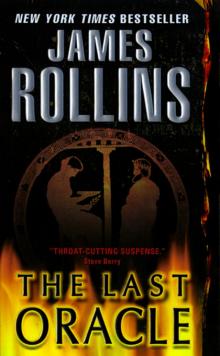 The Last Oracle
The Last Oracle The Judas Strain
The Judas Strain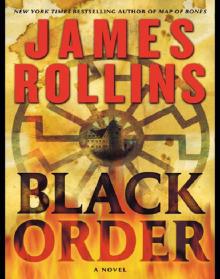 Black Order
Black Order Sandstorm
Sandstorm Ghost Ship
Ghost Ship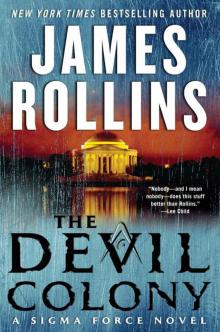 The Devil Colony
The Devil Colony Subterranean
Subterranean The Doomsday Key
The Doomsday Key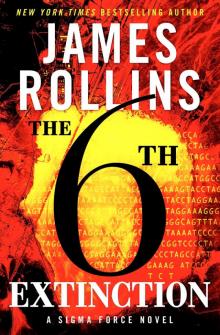 The 6th Extinction
The 6th Extinction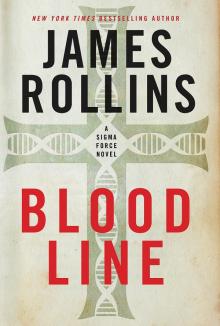 Bloodline
Bloodline Jake Ransom and the Howling Sphinx
Jake Ransom and the Howling Sphinx The Midnight Watch
The Midnight Watch Map of Bones
Map of Bones The Demon Crown
The Demon Crown Deep Fathom
Deep Fathom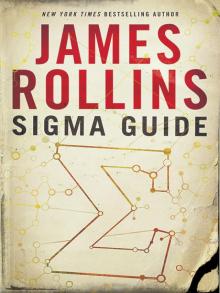 Sigma Guide
Sigma Guide Kowalski's in Love
Kowalski's in Love Jake Ransom and the Skull King's Shadow
Jake Ransom and the Skull King's Shadow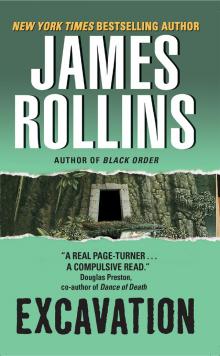 Excavation
Excavation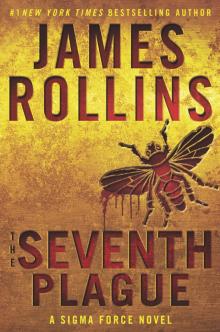 The Seventh Plague
The Seventh Plague Altar of Eden
Altar of Eden Unrestricted Access: New and Classic Short Fiction
Unrestricted Access: New and Classic Short Fiction Indiana Jones and the Kingdom of the Crystal Skull
Indiana Jones and the Kingdom of the Crystal Skull Crucible
Crucible The Eye of God
The Eye of God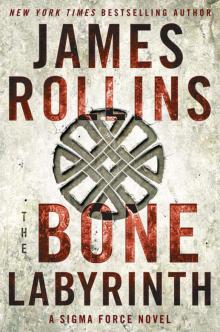 The Bone Labyrinth
The Bone Labyrinth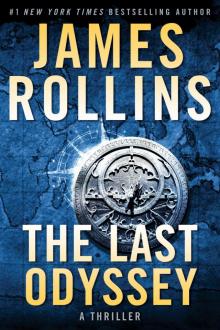 The Last Odyssey: A Thriller
The Last Odyssey: A Thriller Unrestricted Access
Unrestricted Access Amazonia
Amazonia Blood Brothers: A Short Story Exclusive
Blood Brothers: A Short Story Exclusive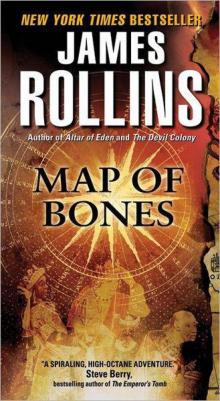 Map of Bones: A Sigma Force Novel
Map of Bones: A Sigma Force Novel The Skeleton Key (sigma force)
The Skeleton Key (sigma force)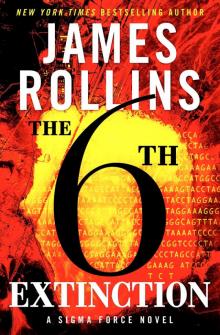 Sigma Force 10 - The Sixth Extinction
Sigma Force 10 - The Sixth Extinction Innocent Blood
Innocent Blood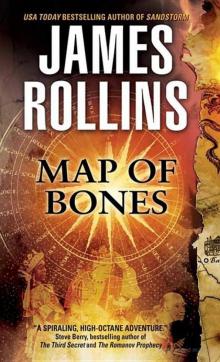 Map of Bones sf-2
Map of Bones sf-2 The Eye of God: A Sigma Force Novel
The Eye of God: A Sigma Force Novel The Eye of God: A Sigma Force Novel sf-9
The Eye of God: A Sigma Force Novel sf-9 The Pit
The Pit Indiana Jones and the The Kingdom Of The Crystal Skull
Indiana Jones and the The Kingdom Of The Crystal Skull The Last Oracle (2008) sf-5
The Last Oracle (2008) sf-5 City of Screams
City of Screams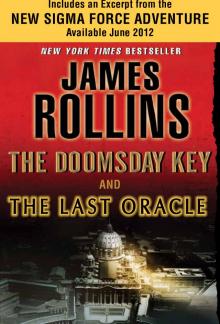 The Doomsday Key and The Last Oracle with Bonus Excerpts
The Doomsday Key and The Last Oracle with Bonus Excerpts The Judas Strain sf-4
The Judas Strain sf-4 Blood Infernal
Blood Infernal The Demon Crown: A Sigma Force Novel
The Demon Crown: A Sigma Force Novel War Hawk: A Tucker Wayne Novel
War Hawk: A Tucker Wayne Novel SANDSTORM sf-1
SANDSTORM sf-1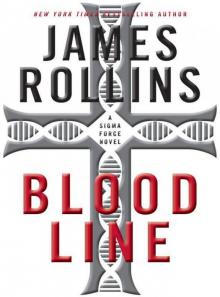 Bloodline: A Sigma Force Novel
Bloodline: A Sigma Force Novel Amazonia: a novel
Amazonia: a novel The Last Oracle: A Sigma Force Novel
The Last Oracle: A Sigma Force Novel City of Screams (the order of the sanguines)
City of Screams (the order of the sanguines) Ghost Ship: A Sigma Force Short Story
Ghost Ship: A Sigma Force Short Story The Doomsday Key: A Sigma Force Novel
The Doomsday Key: A Sigma Force Novel